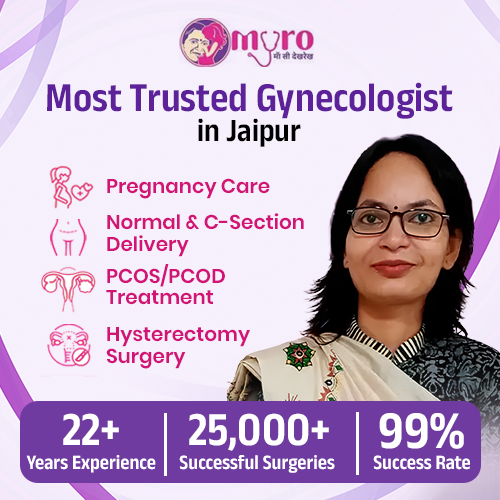
Myro Clinic provide Jaipur high risk pregnancy treatment by the top gynecologists in Jaipur. High risk pregnancy needs special attention to maintain the health and safety of the mother and child. With our personalized process of care, we guide you through the process of pregnancy care and childbirth care to overcome complications. We make sure that from routine check-ups to special care, we are committed to delivering the best quality of care.
In addition to our high risk pregnancy care, we also have other care that will help you make your reproductive system healthier. Find out more on how you can drive away your pre- and post-pregnancy problems.
High-risk pregnancy is pregnancy where mother’s or baby’s health will complicate. It can be caused by any health condition, age, lifestyle, or even twin pregnancy. The moment a pregnancy is diagnosed as high-risk. It needs more attention and monitoring in a bid to decrease the risk of complications.
If you are high-risk pregnancy, then you have to visit a trusted gynecologist such that you and the health of your baby are adequately taken care of.
Myro Clinic offers high-risk pregnancy treatment and checkups. So, if you face any pregnancy complications, connect with the best gynecologist in Jaipur today.
There are certain reasons for a high-risk pregnancy. The most common of these reasons are:
You will need to be under the supervision of the specialist if you experience any of the above. Myro Clinic will keep you under observation to achieve the best pregnancy care in Jaipur.
Need more details? Book an appointment at Myro Clinic for accurate risk evaluation.
There are certain situations which put the baby and mom at higher risk of complications. Some of them are:
Make sure that you have good regular intervals for your prenatal check-ups. Moreover, keep an eye out for any suspected symptoms, all these conditions can be taken care of very well. For instance, if you are going to get gestational diabetes, you might be asked to undergo some cancer tests.
Concerned about any of these conditions? Contact at Myro Clinic for an appropriate assessment of your high-risk pregnancy.
Be alert of warning signs which could be indicative of high-risk pregnancy. In the event you have any of the following. In case you experience any of the following, visit your gynecologist right away:
Any of these symptoms must be treated, and you will need to visit a doctor at once so that complications would be prevented. Most cases of high-risk pregnancy are best managed with due medication during pregnancy.
Do you have some of these symptoms? Myro Clinic invites you to call for emergency consultation and treatment in High Risk Pregnancy.
Pregnancy Although there are some risks you will never be able to avoid. However, you can follow some tips for Normal Delivery that will definitely reduce your high risk chances. Here are a few steps you can take in an attempt to minimize your risk:
By keeping these preventive tips and good medical attention, you become more likely to have a healthy pregnancy.
Require one-on-one consultation? Contact us or visit Myro Clinic to know how we can managed high-risk pregnancy.
Get the safest high risk pregnancy treatment in Jaipur
High-risk pregnancy requires an individualized form of having close mother and baby monitoring. We have:
Also, in the event of other diseases such as infertility, we can offer you individualized treatment for getting pregnant and normal pregnancy.
Had a pregnancy at risk? Myro Clinic’s experienced experts can help you with step-by-step treatment on a one-on-one basis. Book now.
After you have been diagnosed with high-risk pregnancy, you should take precautions:
We provide you with twenty-four-seven care and delivery at Myro Clinic in order to support you further.
Require consultation for your high risk pregnancy? Schedule appointment now at Myro Clinic and take advice from a very experienced gynecologist.
Myro Clinic is the main referral hospital for managing high-risk pregnancy treatment in Jaipur. We have highly specialized gynecologists providing a wide variety of maternal as well as fetal care services. Early diagnosis, treatment tailor-made to individuals, and monitoring on follow-ups are our area of concern in treating complications by right treatment. Our services are:
Dr. Satyamvada Pandey is a renowned specialist in any type of pregnancy treatment in Jaipur. With extensive experience in conducting numerous successful high-risk deliveries, Dr. Pandey is a trusted doctor in this field. It is advisable to discuss your health concerns with Dr. Pandey before planning for pregnancy, as she is one of the Best Gynecologists in Jaipur. Her expertise and specialization in high-risk pregnancies ensure that one receives the best possible care and support throughout their pregnancy journey.
In Myro, she also offers services –
We prefer to offer total reproductive care to women in the best way possible at any age.
High-risk pregnancy is a pregnancy whose mother or foetus’s health will definitely be made complex by age, disease, or other complications in previous pregnancies.
Risk factors are usually usually most commonly the age of the mother, previous illness, twin or multiple pregnancy, and lifestyle issues like alcohol or smoking.
The majority of high-risk women during pregnancy can have healthy children when closely monitored, closy medicinally treated, and closy regulated.
Pay attention to breathlessness, stinging cramps in the abdomen, spoty spotting of the vagina and surrounding area, swelling, and headache.
They are prevented with correct dieting, regular prenatal checks, and care of any pre-existing chronic disease.
